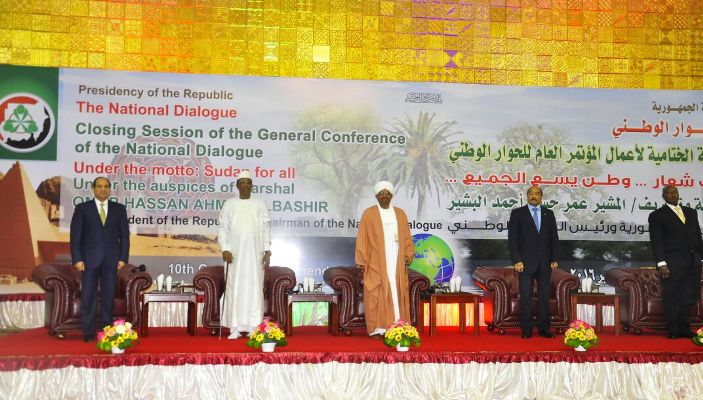Sudan’s president extends ceasefire for two months

October 10, 2016 (KHARTOUM) – Sudanese President Omer al-Bashir on Monday has declared the extension of the unilateral cessation of hostilities in war zones for two months, disclosing that a national mechanism would be established to draft a permanent constitution for the country.
Al-Bashir, who addressed the closing session of the National Dialogue Conference on Monday in the presence of the presidents of Egypt, Chad, Mauritania and Uganda, vowed to take the necessary measures to implement the national document, saying he would continue to consult with all political and societal forces to follow up on the implementation of the national dialogue’s recommendations.
The national document, which was approved by the political and armed forces participating in the dialogue conference, is expected to be the basis for drafting the permanent constitution.
The Sudanese president also announced the formation of a national mechanism to draft the permanent constitution on the basis of the national document in order to achieve political stability in the country, pledging to develop a national strategy to carry out the state reform in accordance with the dialogue’s recommendations.
Al-Bashir renewed the call to the opposition groups to join the dialogue “in order not to miss the historic opportunity” of being part of the unprecedented national consensus that has been achieved through the national dialogue.
He said the national document would remain open for the holdout opposition groups who decide to join it in the future, declaring the extension of the ceasefire until the end of the year in order to create climate conducive for dialogue and peace.
Last June, al-Bashir declared a four-month unilateral cessation of hostilities in the Blue Nile and South Kordofan states where the Sudanese army has been fighting the Sudan People’s Liberation Movement/North (SPLM-N) rebels since June 2011.
In January 2014, al-Bashir called on political parties and armed groups to engage in a national dialogue to discuss four issues, including ending the civil war, allowing political freedoms, fighting against poverty and revitalizing national identity.
However, the political and armed opposition refuse to join the process, saying a genuine dialogue must start by stopping the war, delivering humanitarian assistance, allowing freedoms and releasing political detainees and convicts and then coming together in a forum that is not controlled by any party.
For his part, the Chadian President Idriss Deby called for the implementation of the dialogue’s recommendations, demanding the opposition to join the process in order to resolve the country’s problems peacefully.
The Egyptian President Abdel-Fatah al-Sisi described the national dialogue as “important milestone in the history of Sudan”, praising al-Bashir’s bravery for making fateful decisions to maintain his country’s sovereignty.
Mauritania’s leader Mohamed Ould Abdel Aziz, for his part, said the national dialogue would give strong boost to peace and development efforts in Sudan.
Ugandan President, Yoweri Museveni, also hailed as “great and important achievement for the political class in the country” the consensus that has been achieved by the national dialogue.
He pointed that Sudan missed a lot of opportunities in education and development during 60 years since independence, vowing that Kampala would exert every possible effort to help achieve peace in Sudan.
(ST)
